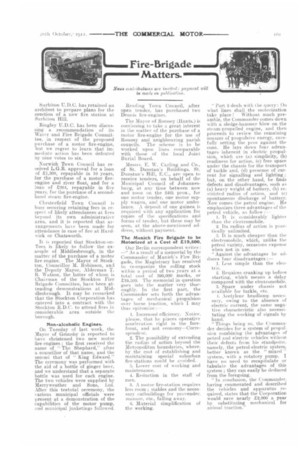Fire-Brigade Matters.
Page 11

If you've noticed an error in this article please click here to report it so we can fix it.
News contributions are invited: payment will be made on publication.
Surbiton 15.D.C. has retained an architect to prepare plans for the erection of a new fire station at Surbiton Hill.
Bingley U.D.C. has been discussing a recommendation of its Water and Fire Brigade Committee, in respect of the proposed nurchase of a motor fire-engine, but we regret to learn that immediate action has been defeated by nine votes to six.
Norwich Town Council has received L.G.B. approval for a loan of £1,308, repayable in 10 years, for the purchase of a motor fireengine and river float, and for a loan of 221)4, repayable in five ,years, for the purchase of a secondhand steam fire-engine.
Chesterfield Town Council is busy securing retaining fees in respect of likely attendances at fires beyond its own administrative area and it is reported that arrangements ha x e been made for attendance in ease of fire at Hardwick or Chatsworth.
It is reported that Stockton-onTees is likely to follow the example of Middlesbrough, in the matter of the purchase of a motor fire engine. The Mayor of Stockton, Councillor M. Robinson, and the Deputy Mayor, Alderman T. B. Watson, the latter of whom is Chairman of the Stockton Fire Brigade Committee, have been attending demonstrations at Middlesbrough. It may be remarked that the Stockton Corporation has entered into a contract with the Stockton R.D.C. to attend fires in considerable area outside the borough.
Non-alcoholic Engines.
On Tuesday of last week, the Mayor of Grimsby is reported to have christened two new motor lire-engines; the first received the name of " The Shephard," after a councillor of that name, and the second that of " King Edward." The ceremony was performed with the aid of a bottle of ginger beer, and we understand that a separate bottle was used for each engine. The two vehicles were supplied by Merryweather and Sons, Ltd. After this teetotal ceremony, the various municipal officials were present at a demonstration of the capabilities of the motor pump, and municipal junketings followed.
Reading Town Council, after open tender, has purchased two Dennis fire-engines.
The Mayor of Ronisey (Hants.) is continuing to take a great interest in the matter of the purchase of a motor fire-engine for the use of Romsey and neighbouring parish councils. The scheme is to be worked upon lines comparable with those of the local Joint Burial Board.
Messrs. E. W. Carling and Co., of St. Dunstan's Buildings, St. Dunstan's Hill, E.C., are open to receive tenders, on behalf of the Municipal Council of Johannesburg, at any time between now and noon on the 24th prox., for one motor tender, one motor supply wagon, and one motor ambulance. A deposit of one guinea is required with any application for copies of the specifications and forms of tender, but these may be seen, at the above-mentioned address! without payment.
The Munich Fire Brigade to be Motorized at a Cost of £19,500.
Our Berlin correspondent writes: —" As a result of a memorial by the Commander of Munich's Fire Brigade, the Magistracy has resolved to re-organize the rolling stock within a period of two years at a
total cost of 390,000 marks, or•1:19,300. The memorial in question
goes into the matter very thoroughly. In the first part, the Commander sets forth the advantages of mechanical propulsion over horse traction, which I may thus epitomize 1. Increased efficiency. -Notice. please, that he places operative acceleration right, in the _ forefront, and not economy—Correspondent. 2. The possibility of extending the radius of action beyond the Metropolitan boundaries, whereby the cost of establishing and maintaining special suburban fire-stations could be avoided.
3. Lower cost of working and maintenance.
4. Reduction in the staff of men.
5. A motor fire-station requires less room ; stables and the necessary outbuildings for provender. manure, etc., falling away.
6. Material simplification of the working.
Part 2 deals with h the query : On what lines shall the motorization take place ? Without much preamble, the Commander comes down with a sledge-hammer blow on the steam-propelled engine, and then proceeds to review the remaining sources of propulsive energy, carefully setting the pros against the cons. He lays down four advantages inherent in electric. propulsion,. which are (a) simplicity, (b) readiness for action, (c) free space under the chassis for the transport of tackle and, (d) presence of current for signalling and lighting ; but, on the other hand, he finds defects and disadvantages, such as (a) heavy weight of battery, (b) restricted radius of action, and (c) spontaneous discharge of battery. Now comes the petrol engine_ He emphasizes three advantages of the petrol vehicle, as follow :-
1. It is considerably lighter than the electromobile.
2. Its radius of action is practically unlimited.
3. It is much cheaper than the electromobile, which, unlike the petrol variety, occasions expense when not in use.
" Against the advantages he adduces four disadvantages :—
1. Less simple than the electric.
2. Requires cranking up before starting, which means a delay compared with the electromobile. 3. Space under chassis not available for tackle etc. 1. Acetylene headlamp necessary, owing to the absence of electric current, the same negative characteristic also necessitating the working of signals by hand.
" Things being so, the Commander decides for a system of propulsion combining the advantages of petrol and electric vehicles without. their defects from his standpoint, namely, the petrol-electric system, better known as the " mixed " system, with a rotatory pump. I have no need to recapitulate or tabulate the advantages of this system ; they can easily be deduced from the foregoing. "In conclusion, the Commander. having enumerated and descnbed the vehicles and apparatus required, states that the Corporation would save newly £2,000 a year by substituting mechanical for animal traction."






















